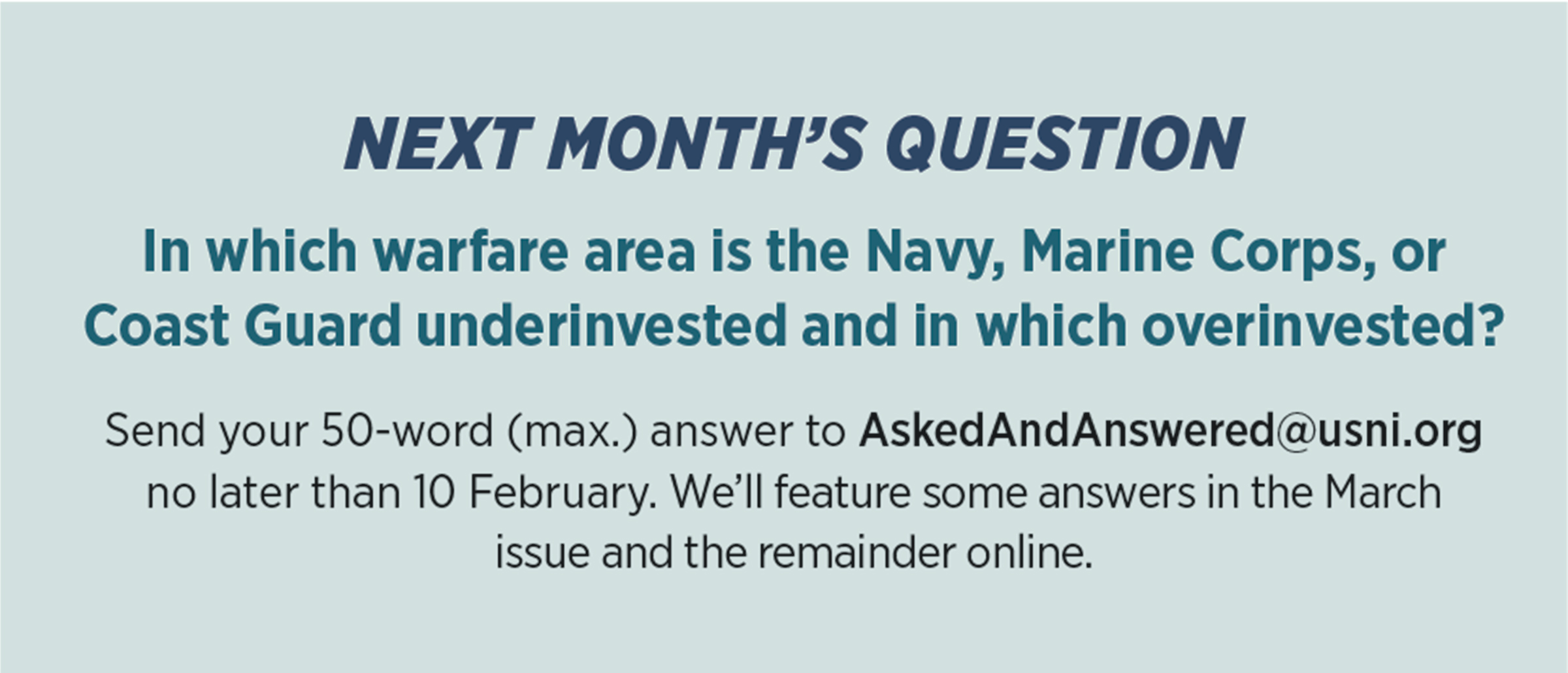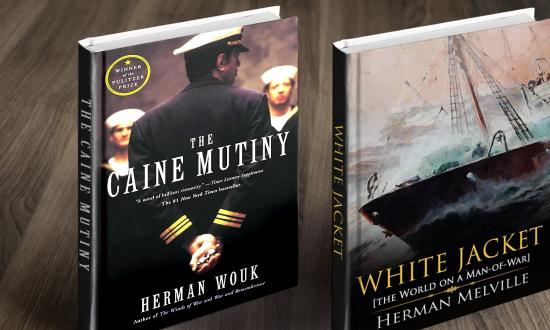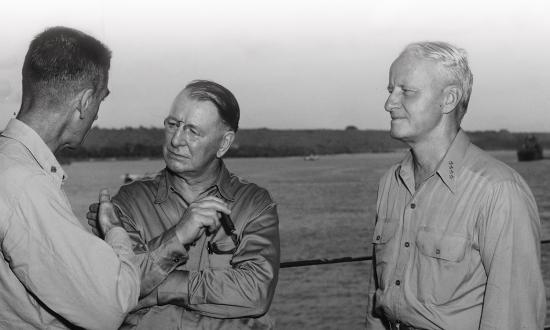Captain Scott A. Van Hoften, U.S. Navy (Retired)
Sometime between 1978 and 1981, I was holding captain’s mast for a young sailor accused of possessing and using marijuana. Having found him guilty, I announced the punishment. Following the mast, I asked the sailor how he had obtained the marijuana. He began to cry and blurted out, “My mother gave it to me!”
Commander Gordon Mitchell, U.S. Navy Reserve (Retired)
A petty officer second class was accused of a relatively common offense. The captain announced a reduction in rank to petty officer third class. I saw the sailor turn his head and blow off the top chevron of his carefully prepared rating badge. The captain calmly told him, “You can blow the next one off, too!”
Senior Chief Tony A. Ramey, U.S. Navy (Retired)
Once, when I was a master-at-arms on board the USS John F. Kennedy (CV-67), the commanding officer gave a sailor 30 days in the correctional custody unit. The sailor then turned, ran out of the room, and jumped overboard. We were in port and sailors working on the pier fished him out of the water. He had numerous jellyfish stings all over his face and body.
Captain Rick Miller, U.S. Navy (Retired)
During executive officer’s inquiry, after getting a young seaman to admit what he did, I had him call his mother at home and explain it to her. She chewed him out better than I could have, and we never had a conduct issue with him again!
Senior Chief Ken Badoian, U.S. Navy (Retired)
On board the USS Vreeland (FF-1068) moored in her homeport, captain’s mast was being held on the bridge. A mouthy sailor at mast told the captain he wanted out of the Navy and suddenly ran and jumped over the side. But, instead of hitting Mayport water, he slammed down on the barge alongside. He got out without disability but with a bad back.
Don Chappell, U.S. Marine Corps Veteran
A Marine recruit on mess duty
found a bag of chocolate chips. Seven weeks deprived, this chocoholic helped himself to several handfuls before being taken swiftly to nonjudicial punishment. The terrified recruit was trembling at his captain’s faux-outrage at this theft of government property, when the captain noticed the recruit holding something. His hand was still full of melted chocolate. That’s getting caught “red handed”!
Commander Robert Pezold, U.S. Navy Reserve (Retired)
In 1977, at a captain’s mast on board an aircraft carrier at Naval Air Station North Island in San Diego, California, the commanding officer read the charges and asked the sailor what had happened. The accused pulled out his wallet, flipped it open and said, “(His name) to Enterprise. Beam me up, Scotty!” The commanding officer did not react well.
Staff Sergeant Alan Wika, U.S. Army (Retired)
In 2007, I saw a sergeant first class (E-7) come up hot on a urinalysis. Normally that’s a career-ender, but he skated. Why? The O-3 company commander who ordered the urinalysis came up hot on his own test. He was gone shortly afterward.
Ed Erdmann, U.S. Navy Veteran
During captain’s mast on board the USS Barbour County (LST-1195), a 6' 2" sailor was disrespecting the 5' 4" captain with a poor attitude and disrespectful demeanor. The captain paused, pointed at the yardarm, and said, “Do you know that I have the power to hang you up there by your neck until you’re dead?”
Commander Kenneth E. Pepper, U.S. Navy (Retired)
I was the chaplain on board the USS California (CGN-36) during a home port change from Norfolk, Virginia, to Alameda, California, in September 1983. While transiting the Panama Canal, it was discovered that the supply office and store keeper first class were embezzling money. A captain’s mast was held after exiting the Canal. Not long after the mast, the store keeper had a heart attack. The Coast Guard at San Diego rescue helicopter was unavailable, so we sailed into San Diego to drop him off to be taken to hospital. The officer was transferred to Naval Base Treasure Island on arrival to await court martial.
Henry H. Brus III, U.S. Navy Veteran
The ship was in the yard for an overhaul. The master-at-arms caught four sailors in an open tank, smoking marijuana. The tank had recently been drained of fuel and had been prepped for painting. The sailors were surprised that the Polaroid photos they took of each other in the tank were entered as evidence against them.
Captain Rich Sloane, U.S. Navy (Retired)
A day away from Rota, Spain, with no brig on the ship. While captain’s mast was being broadcast over the ship’s closed-circuit television, the commanding officer asked the executive officer if there was a brig on Rota Naval Station. The executive officer affirmed, and the commanding officer sentenced the accused to three days of bread and water. You could hear the cheers from the chief’s mess down below.
Senior Chief Tony A. Ramey, U.S. Navy (Retired)
On board the USS John F. Kennedy (CV-67) in 1983, I was a master-at-arms second-class petty officer tasked with ensuring the wayward sailors were present at captain’s mast. I taught them how to present themselves to the commanding officer at the podium and the proper military bearing. One sailor, who had been a deserter for two months, did all of the proper salutes and other military protocols. At that point, the commanding officer leaned over the podium, glared at him, and shouted “Welcome back, asshole!” The chiefs and officers in attendance were shocked and one of the department heads busted out laughing. We all laughed on the inside.
Petty Officer Anthony J. Och, U.S. Navy (Retired)
7 December 1985, Sasebo, Japan. A machinist mate second class and I in dress blues out on Sake-Town, free beers all night! Street fighting in Sailor-Town—apprehended! At mast the captain says, “E-5s acting like non-rates, non-rates acting like bums!” Read the charges, dismissed, hand salute, about face—why most memorable? I’ll never forget it!
Captain Bob Whitlock, U.S. Navy Reserve (Retired)
In 1963, I was legal officer on board the USS Ranger (CVA-61) as it was heading to Yankee Station off Vietnam. At captain’s mast shortly before arriving, the master-at-arms read the charge against a nervous non-rated sailor: “urinating in a binjo ditch” (a trench to carry sewage to who knows where). The captain turned to me and asked if that was an offense under the UCMJ. I said that if he considered it conduct prejudicial to good order, then it was. The captain threw up both his arms and declared “I’m guilty.” Word of the proceeding passed among the 5,000 sailors and marines on board in about 20 minutes.
Lieutenant Commander Paul H. Case, U.S. Navy (Retired)
When I was first lieutenant on board the USS Nassau (LHA-4) in Norfolk, Virginia, in the mid-1980s, a young sailor went U/A and returned to California. His father talked him into returning to the ship, but by the time he returned to Norfolk, the Nassau had entered Norfolk Naval Shipyard. Not finding her at the naval base, he went to a friend’s house on Willoughby Spit where they proceeded to drink the day away and eventually got hungry and ordered pizza. Unfortunately, they had no money and asked that the pizza be delivered to an address down the street. While robbing the delivery woman, the miscreant pulled a knife and, when arrested, was charged with armed robbery. I and his division officer had to explain this odyssey at captain’s mast with a straight face.
Commander Jim Bennett, U.S. Navy Reserve (Retired)
A sailor charged with purchase, possession, and trafficking of drugs was shown the video provided by NIS/Army CID of him purchasing the drugs, leaving, then returning to sell some back to the agents. The video ended with commanding officer asking for his defense. Dead silence, followed by penalty phase. Short and sweet, yet so memorable.
Robert F. Hutchinson, U.S. Air Force Veteran
It was the 1960s and the airman wanted out of the military. He tried going AWOL but wasn't discharged. He confessed to being a member of a revolutionary organization and ratted out friends from high school as members. The FBI investigated and found nothing. I always wondered what happened to him at home.
Lieutenant Commander Sankey Blanton, U.S. Navy (Retired)
I told the commanding officer (CO) he had violated my rights under the UCMJ and I was going to take a 72-hour liberty or else talk to the base JAG. I advised him and the executive officer (XO) to determine who would take over all my additional duties—top secret control officer, senior watch officer, cms officer, and navigator. I also pointed out that I was the least-paid officer because I was single and lived aboard the ship while all the other officers went home to their wives on a regular basis. At the time, no other department head had stood a duty watch on the ship for more than a year, and the supply officer and XO did not stand a watch.
The kicker was that I reminded the CO about our first meeting when I had stressed that I needed to be relieved and rotated off the ship on time, which he had apparently forgotten. My relief should have happened two months prior, but the Navy had yet to select or assign anyone. I also reminded the XO that I had advised him immediately when I started psychological counseling at Long Beach Naval Hospital because I had been passed over during the past two years. I regret that I was yelling by the end of the mock-UCMJ proceedings. I got 72 hours liberty.
Petty Officer First Class John Doe, U.S. Coast Guard (Retired)
My own. My commanding officer closed the mast to the public, as she thought I may have an emotional breakdown. That and her denying me a mast representative of my choice were her mistakes. By closing the mast, in effect, she reduced her rank from O-5 to O-3 in terms of what punishment she could administer. O-3s cannot reduce enlisted in rank according to Correction Board for Military Records. I won on appeal.
Captain Bruce K. Bohnker, U.S. Navy (Retired)
My most memorable captain’s mast was while serving as flight surgeon for a Mayport HSL squadron. The sailor in question kept sleeping through scheduled events, as part of the preparation for a helicopter detachment to deploy on a Mayport based ship. I was needed at the mast to provide a medical statement that the sailor did not have narcolepsy. There were about 15 squadron personnel in the room with the squadron commanding officer (CO). I was standing in the back row trying to maintain a low profile. The sailor was brought in and reported to the CO, who carefully reviewed the charges, then the sailor’s personnel records. The CO then asked me for a medical opinion: “Does this Sailor have narcolepsy as a medical diagnosis causing his problems.” I responded “no sir.”
Then the CO started speaking loudly at the young sailor. It was not quite a yell, but everybody in the room could clearly hear his communications, and understand that he was not satisfied with the sailor’s performance. He offered comments about the sailor’s uniform, his haircut, his posture, and his apparent attitude. The CO then started his loud conversation with the leading petty officer for the young sailor followed by his chief petty officer, the division officer, and finally his department head.
Then he refocused his attention with more loud discussion at the young sailor. I am shaking in the back row of the entourage, watching this happen. The outcome was that the CO found the sailor guilty and his sentence was restriction to the Mayport-based ship. In retrospect, and after a decade of reviewing that event, I think the concern was that the sailor would miss the ship’s movement with his continued poor attendance. The mast outcome of restriction to the ship until the deployment was an effective way to make that impossible, and was a negative reinforcement on missed family time as well.







